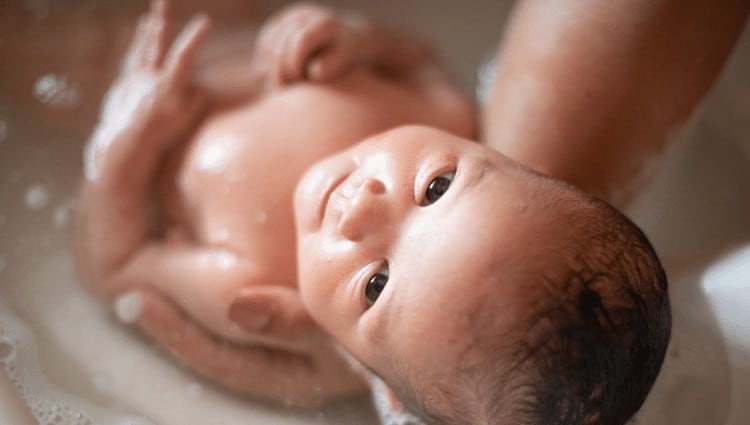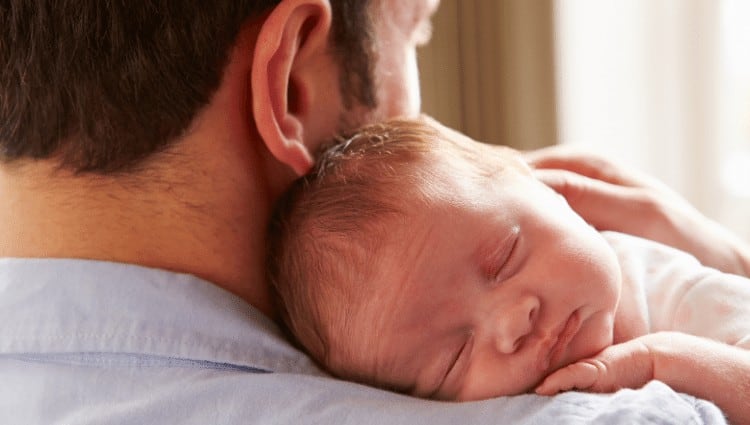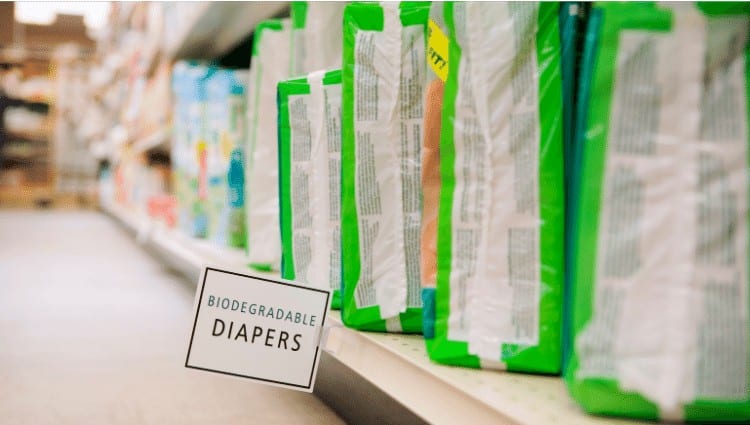Know everything to look forward to when your baby turns 2 months old
Medically Reviewed by: Dr. Kedar Patnekar (MBBS, D.N.B, D.C.H, Specialist Pediatrician) Dubai, UAE.
-
Author: Khushboo Kirale
- >> Post Created: October 8, 2020
- >> Last Updated: May 1, 2024
Your baby is 2-months old already!
Your baby has grown and so have you as parents. Some sleepless nights of the first month might have seemed like they are never-ending, but you did make it through, didn’t you? Few weeks more and your baby will sleep through the night (yes, there is light at the end of the tunnel). This also means you get to sleep as well, isn’t sleep great.
But before you can start dozing, there is a lot to look forward to when your baby passes the first month mark. There are some 2 month milestones that can be observed in your growing baby.
We have covered the 2 month milestones that are seen in 2-month-old babies on an average. But if don’t observe the same developmental milestones in your baby, there is no need to worry. As long as their pediatrician is happy with their growth, you should relax and enjoy the time with your 2-month-old.

2 Month Milestones - Table of Contents
What are developmental milestones?
Baby is adjusting to the new surrounding that they have been pushed into suddenly. Therefore, they are very cranky and fussy. But by the time they are 2-months old, they seem to be getting used the environment and are now looking to grow and develop quickly so that they can enjoy everything around them.
Developmental milestones is the way you will be able to check your baby’s development easily. It will be anything that the baby has not done before or that has not happened to them before.
These 2 month milestones can be observed in the physical appearance of the baby, their behavior, their eating, sleeping, crying, pooping, etc. patterns, changes happening inside the body like muscles, bones, brain, etc.
Your baby is growing so fast that if you look at your baby at the start of the month and at the end of the month there will be a significant difference not just physically but also in the baby’s capabilities.
So we are going to look at the average 2 month milestones of a baby. Your 2 month old baby may or may not have reached those 2 month milestones, but rest assured that they soon will.
Also remember that if your baby is premature, they will reach these 2 month milestones a little later and consequently all the other milestone in the future will also be observed later in your baby. So don’t worry
Related Posts:
- 3 Month Milestones: What are the Developmental Milestones of My 3 Month Old Baby??
- 4 Month Milestones: What are the Developmental Milestones of My 4 Month Old Baby??
- Your Absolute Guide to Simplify Let-Down Reflex (Milk Ejection Reflex) with 12 Tips
- Cluster Feeding – How to Identify and Manage Cluster Feeding
- Buying Diapers in Bulk? Here are 12 Best Budget Diapers you need to keep an eye out for.
2 month milestones: baby weight and height/length
The average weight of a 2 month old baby girl is around 11.3 pounds and that of a 2 month old baby boy is 12.3 pounds.
The average length or height of a 2 month old baby girl is 22.5 inches and that of a 2 month old baby boy is 23 inches.
But weight & height may vary according to circumstances (maternal health & gestational age at the time of delivery). So pls follow your doctors advice.
The above measurements are as per the World Health Organization.
But some babies may have been born with a lower birth weight and height or a higher birth weight and height than the average and will not fall in-line with the 2 month milestones numbers. So remember that no matter what their starting weight or height was, they should have gained about 1.5 to 2 pounds and have grown about 1 to 1.5 inches as compared to the last month. The head will also be an inch bigger now.
Always remember that all these numbers are just averages. Babies are seen to grow in spurts, and it may so happen that your baby’s growth spurt has not happened yet. So don’t fret over it.
We know that monitoring your baby’s weight and height is something we all do just to get some concrete evidence that our child is growing. But don’t get stuck on the average and feel disheartened. Babies come in all sizes and will have a different growth rate.
As long as your baby is growing, you are on the right track. Consult your pediatrician if you are ever concerned.
2 month milestones: the five senses
There are many changes in your baby compared to their first month. The five senses are also growing and adapting continuously. Let us look at the 2 month milestones that can be observed in a baby with respect to the five senses:
Smell & Taste
Smell and taste develop early during fetal growth. Once the baby is out of the womb, they can easily find their mother simply by smelling her because of the familiarity of the sense of smell when they were inside the womb. The baby will always turn their head after a few seconds and look at the mother.
This is because the baby’s sense of smell is really developed way before the eyesight, and they can easily distinguish you and your partner’s scent (or the people comforting and taking care of them) from strangers.
We also know that taste is also dependent on smell. Newborns can taste everything except salt. As per research babies can taste salt only when they are 4-5 months old. Even though babies can taste everything, they do have an affinity towards things that are sweet. So they are actually born with a sweet tooth (yes, even toothless babies can have a sweet tooth).
Visual
- Your baby’s eyes are moving more and can focus on particular objects easily. They can see objects 18 inches away from them clearly.
- In fact, they have started tracking moving objects. Try moving a toy or your finger in front of them and see whether their eyes follow it. They will have the ability to follow the objects full 180 degrees.
- Instead of simple patterns with straight lines, the baby can now observe more complex patterns like circles and spirals.
- They can also see colored objects better than the boring black and white world they were used to.
- Hang a colorful mobile over the crib for them to enjoy and admire.
- Now that they can see better they will be able to recognize your face. They will look for their primary caregivers and will be able to identify their parents easily.

Hearing
- Your 2 month old baby will also turn into a social butterfly. They will try and respond with coos, aahhs, oohhhs, and gurgles to be a part of the conversation.
- They will become more interested in having a conversation and will listen to you intently.
- Your baby’s hearing has also improved. They will especially enjoy listening to your voice and will be comforted by it.
- Try singing or reciting a poetry or just reading a book or nursery rhyme. They don’t understand anything, but they will enjoy the sound.
- You can use white noise also to comfort them and help them sleep quickly.
Touch
- The baby will also recognize your touch and will be comforted by it.
2 month milestones: all other significant changes to look forward to
- Your baby is getting stronger with every passing day. Perhaps they are trying to lift their shoulders and head during tummy time, babies are trying to hold their head steady when sitting in your lap.
- Let you baby have plenty of tummy time so that they can practice lifting their head, taking them one step closer to becoming independent. The practice will also help the baby strengthen the neck muscles which will help them hold their head high, literally.
- This month the baby’s legs are also getting stronger, so you might feel the kicks harder now.
- Their legs are also straightening out which will help them when they practice standing and walking.
- This month your baby will start smiling at you. A true genuine smile. That toothless grin can melt anybody’s heart. But if your baby has not started smiling yet, don’t worry, they soon will. It’s called social smile.
- Overall, your baby’s movements will look smoother and more fluid from this month, rather than the jerky movements of the first month.
- The baby will keep moving and try new positions. These movements are good, as it will help strengthen the baby’s body muscles.
- As the baby becomes more aware about their surroundings, they become more playful with their hands. They will try to hold and touch everything within reach.
- These increased hand movements will lead to the baby using their fists for sucking to self-soothe. This is a blessing, as the baby will cry less frequently.
- Even though they cannot play with the toys yet, they will briefly be able to hold the toy in their hands. But keep your eyes on them, their grip is not strong enough which may cause the toy to fall on them and may even hurt them. Using toys which are soft should be preferred at this stage.
- You will also notice that your baby’s nails have started growing at the speed of light. You will have to conduct regular mani–pedi sessions for your child. If you are not sure how to clip the baby’s nails, ask your doctor on safe ways to cut or file your child’s nails.
- There is a soft spot on the top of your baby’s head which is called the posterior fontanelle. This part should close when the baby becomes 2-months old. In some cases, it may remain open even when the baby is 3-months old, but will eventually close for sure. But if you are worried, consult your doctor to know about any issues that may arise because of the posterior fontanelle remaining open.
When to be concerned?
A mother is a mother, and she will keep worrying about every tiny thing concerning her baby. But you don’t need to increase your pressure unnecessarily. If your baby has not reached the 2 month milestones, there is nothing wrong with them. But there are a few things that you should discuss with your doctor to help them understand and monitor your baby’s progress.
Contact your pediatrician:
- If your baby does not respond to loud sounds or is unable to follow the sound of your voice.
- If your baby has not started smiling yet. They should start grinning when they see their mommy’s face.
- If your baby has not yet used his fist to self-soothe or their hand movements are restricted and don’t reach their mouth yet.
- If you notice your baby is not eating well or is not gaining weight. By the time the baby becomes 2-months old, they should have gone through a growth spurt. But this growth is hard to evaluate by yourself. Take your doctor’s help to monitor your baby’s growth properly.
- If your baby does not recognize your face or any other persons face. Your face should be your baby’s favorite thing when they are 2-months old. They should start kicking their legs in excitement and have the broadest smile on their face when they see you.
- If your baby can’t track movement like that of a colorful toy, rattle, or your finger when move it horizontally.
- If your baby is unable to lift their head and shoulder during tummy time or when you hold them on your shoulders or chest.
None of the above circumstances are a matter of concern. If your baby does not perform these 2 month milestones yet, they will soon be able to. We are just suggesting you talk to your doctor about them so that they can monitor your baby and specify when your baby might show these average 2 month milestones.
2-months milestones—your 2 month old baby’s feeding pattern
Feeding your baby will be taking a large part of your time whether through breastfeeding or bottle feeding. But adequate and frequent feeding is important to sustain your baby’s growth spurts.
Another 2-month milestone for your baby is that they will now be able to signal you when they are hungry, like smacking lips, crying, reaching for your breasts, sucking, etc., and also when they are done feeding, like doze off to sleep, get easily distracted, move the mouth away from the bottle or your breasts, refusing to take more feed by turning their face away, etc. Continue to follow your baby’s hunger cue and feed them when they want you to.
One more thing to keep in mind is that the babies who are dependent on formula may have a different schedule as compared to the babies who are dependent on breast milk.
This difference in schedules between formula-fed babies and breast milk-fed babies is that formula fed babies feel fuller longer and, therefore, may sleep for a longer duration during the night and during daytime.
The time between each feedings is also longer for formula-fed babies as compared to breast milk-fed babies.

2 month old eating requirements
Bottle feeding
If you are using formula to feed your baby then the baby has to be fed at the intervals of every 3 to 4 hours, while ensuring you feed 4 to 5 ounces of feed each time. Just like adults, kids may sometimes have an extra-large meal one time and a smaller meal another time. This is quite normal, and you don’t need to worry, as long as your baby feeds adequately throughout the day.
Breastfeeding
If you are breastfeeding, you will probably have to feed every 2 to 3 hours until the baby is content. If your baby sleeps for longer stretches (you are so lucky!), there is no need to wake them up for a feed. Your baby will let you know with adequate signals when they are hungry. Feeding should be on baby’s demand.
Can the baby eat anything new this month?
It is best to feed your baby solely on breast milk for the first 6 months. Only in special circumstances you should give them formula.
Many parents wonder whether they can give water to the baby. The answer is no.
Solid foods and water should only be introduced after 4 to 6 months. Discuss it with your pediatrician to decide when is the right time to introduce water and solid food for your baby.
2 month milestones—your 2 month old baby’s sleeping pattern
A typical 2 month old baby sleeps for about 15 to 16 hours a day. Babies will sleep for about 8 to 9 hours at night (interrupted sleep, off course). Babies will sleep for a total of about 7 hours in daytime which is spread into 3 to 4 naps throughout the day.
Your baby will start sleeping for longer stretches at night as compared to the first month. Slowly and steadily the stretches will keep increasing giving you uninterrupted sleep during the night in just a couple of weeks (Yay!). Some parents have even reported that their babies sleep for about 5 to 6 hours uninterrupted sleep in the night when the baby is 2-months old.
Some parents question whether they can start sleep-training their 2-month-old. Many doctors recommend to wait till the baby is at least 4 months old before you commence sleep-training. When babies are 4 months old, they naturally feed lesser in the night and will develop a more established sleep pattern.
But you can prepare your baby for sleep-training from now itself. As soon as you see that your baby is sleepy, place them in the crib while they are still awake. You can follow this for all naps and bedtime. This will help your baby learn the skill to put themselves to sleep, which will take them one step further in attaining uninterrupted sleep in the night.

Socializing is completely fine, but some babies try and push their limits of staying awake and become overtired. Overtired babies are crankier and more difficult to put down to bed.
On the other hand there are 2-month-old babies that sleep all day and refrain from sleeping at night. It is okay if your baby does that, but if you are concerned, talk to your pediatrician and resolve any queries you may have about your baby.
2 month milestones—your 2 month old baby’s health
As your 2 month old baby continues growing and developing physically as well as behaviorally, every tiny change in them will make you wonder whether this is a symptom for something and whether it is normal. We are listing a few of the common health problems that 2-month-old babies might face:
Poop
Yes, we are going to talk about the baby poop now, the bane of your existence. If your baby is predominantly feeding on formula, they tend to poop about 1 or 2 times a day, whereas babies who are predominantly fed on breast milk don’t poop that often (another great reason to breastfeed).
They can even go seven days without pooping and be completely healthy. Rather than looking at the frequency you need to monitor the consistency of the poop (Gross! I know). Still consult your doctor to ensure your baby is not constipated.
Constipation
If your baby is constipated, their poop will almost be like hard balls and their belly will also be hard and rigid to the touch. Consult a doctor immediately to relieve the baby.
Diarrhea
If your 2 month old baby’s poop is more watery and runny than usual, then they might be suffering from diarrhea. Consult your doctor immediately to ensure your baby does not get dehydrated.
Coughing
Coughing is caused by many things including the common cold. Consult your doctor to figure out the reason for the coughing and also the remedy for the same.
Sneezing
I know babies looks super cute when they sneeze, but if they are sneezing frequently it could be due to some allergies. Your 2-month-old could also be extra-sensitive to the pollutants and irritants in the air. Their tiny respiratory tracts are still developing and anything unusual in the system can trigger sneezing.
If your baby is sneezing a lot you treat the situation by removing the common irritants, like pet dander, dust, soft toys, etc., from their environment. You can also use a cold-mist humidifier to keep the air from getting dry. If your baby also has a stuffy nose, try saline nose drops to clear the nasal passage of any irritants.
Thrush
It is a mild yeast infection which is common in babies and can be easily cleared up with some prescription medicine like Nystatin. If your 2-month-old has thrush, you will notice white patches on the tongue that you are unable to clean or white patches on the inside of the cheeks.
Infants can develop thrush if they are breastfeeding or if you or your baby is on any antibiotics.
Baby acne
If your 2-month-old has baby acne, flaky skin, or drooling rashes, don’t worry, it usually clears on its own without treatment.
Infants can also suffer from dry skin, so use mild soaps and creams to ensure the moisture is locked into the skin. Using a mild moisturizer 1 or 2 times a day can help. Avoid baby wipes that have alcohol, as they will make the skin dry. If your baby is drooling a lot, you can use a bib to prevent the drool from touching the skin.
Reflux
If your baby is spitting up after eating, it could be due to overfeeding or because the stomach valve is still immature. There is nothing to worry about, with time the condition resolves by itself. But if the spitting causes coughing or choking or you notice the baby is not gaining weight, it can be a matter of concern.
There are also some preventive measures that you can take to avoid reflux, like frequently burping the baby while feeding, you can control the flow of the milk in the bottle so that the feeding happens slowly, avoid vigorous activity right after feeding, avoid applying pressure on the belly after the baby has been fed, etc. But if nothing helps and the reflux is affecting your growth, consult a doctor to rectify the situation.
Blocked tear ducts
Extremely watery eyes can be caused by a blocked tear duct. This usually clears up on its own before the baby becomes a year old. It is only a matter of concern if the eyes get infected. Seek medical help so that your doctor can prescribe drops to clear the infection.
Diaper rash
Those pesky diaper rashes are unavoidable. At some point all babies get it. Diaper rash will clear up in a couple of days with the help of rash creams. You can also try special diapers for sensitive skin. These sensitive skin diapers are made from natural materials. Also ensure that baby gets a diaper free time. This exposes skin to fresh air which is good for blood circulation and keeping the skin healthy.
You can also apply diaper rash cream when you are travelling to avoid diapers rashes from appearing. There are home remedies for diaper rash as well. In fact, lot of people also use DIY home recipes for diaper rash. But if the rashes are not clearing up in a couple of days and appear bright red, it could also be a fungal infection, which can be cleared with the help of anti-fungal cream. Keep your doctor posted if the rashes are persistent.

Upper respiratory infections
If your baby has an infection or has a runny nose, it can be difficult to manage at this age. Babies can get extremely agitated and cranky and you might reach for some over-the-counter medication to help them. But these medicines are not the safest choice for a 2-month-old.
Instead use saline drops and a bulb suction to keep the baby’s nasal passage clear. If the runny nose is accompanied by a high fever, has difficulty in breathing, or shows no sign of improvement even after 10 days of home remedies, contact your pediatrician immediately.
Heat rash
A hot and humid climate can affect your baby and heat rashes may appear on the arms, legs, neck, or the diaper area. There is no need to apply any special creams or ointments.
Try using cool water to clean the skin and then dry completely. Dress the baby up in dry and cotton clothing and keep them out of heat. Heat rash will typically go away in a couple of days. Contact your pediatrician if the rashes are persistent.
Eczema
If the crooks of the elbow and knees show red, itchy, and scaly patches, then your baby probably has eczema. Your pediatrician will diagnose the condition and provide treatment options. Avoid strong scented baby soaps and other baby products. Ensure that the clothes your baby wears are washed with mild detergents and are not prickly. Bathing the baby not more than 3 times in a week is preferable.
Allergies
Your 2-month-old may also have some allergies or sensitivity that haven’t been diagnosed yet. If your baby is excessively fussy, vomits after every feed, the poop is very watery, bloody stools, rashes on the body, etc., then these could be signs that your baby is allergic to something. Consult your doctor to find the allergen that is affecting your baby and the corresponding treatment plans.
2 month milestones—checklist and tips for your 2 month old baby
- The first and the foremost thing to do is to visit your baby’s doctor for their 2-month-old check-up.
- You may see the pediatrician performing a special check-up of the hips by rotating the baby’s legs clockwise. This does not hurt the baby, but it is an important test to check for hip dysplasia.
- Don’t forgot the scheduled vaccinations for this month. According to the American Academy of Pediatrics (AAP), a 2 month old baby should receive DTaP (diphtheria, tetanus, and pertussis), pneumococcal (PCV13), Hib (haemophilus influenzae type-b), rotavirus, and IPV (inactivated poliovirus) immunizations during the 2-month visit. If the baby was not vaccinated with the hepatitis B vaccine in the first month, then the baby will have to be given that as well. Consult your doctor about any side-effects that you may be concerned with.
- We know it’s hard to see your baby in pain when they are given the shot, but it’s only going to hurt your baby for a second, and they will not even remember it when they grow up. The pain is insignificant in front of the protection your child will gain against some deadly and dangerous diseases.
- Some parents are also concerned that sustaining the baby only on breastfeeding will cause a vitamin D deficiency. Talk to your doctor about administering Vitamin D drops.
- Allow your baby plenty of tummy time to strengthen those neck and arm muscles.
- And last but not the least, your baby is smiling now, so don’t forget to take your baby’s 2-month-old photos.
Final Thoughts
For a new parent, it might be very exciting to track your baby’s 2 month milestones. But don’t go overboard in your tracking and make those excel sheets and corresponding charts and graphs (you might think I am being sarcastic, but I do know parents who have maintained day-to-day records of their child’s growth).
Babies hit their 2 month milestones at different times, anywhere during the month or even after it. So wait for them to grow, trust me, they will grow up before you know it, and you will miss these baby moments.
There is nothing wrong with your child if they haven’t reached the 2 month milestones. But if you are concerned about anything, contact your baby’s pediatrician and resolve all our issues and concerns.
Now enjoy your baby’s 2 month milestones and wait for the 3-month milestones, more sleep awaits you (Yay!).










I’ve been exploring for a high-quality articles or blog posts on this topic. Exploring in Yahoo, I at last stumbled upon this website. Reading this info I am happy to convey that I’ve a very good feeling I discovered exactly what I needed. I most certainly will make sure not to forget this website and give it a glance on a constant basis.